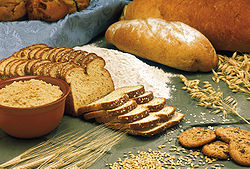 Birkat Hamazon is recited after consuming a meal eaten with bread | |
| Halakhic texts relating to this article | |
|---|---|
| Torah: | Deuteronomy 8:10 |
| Mishnah: | Berakhot ch. 7 |
| Babylonian Talmud: | Berakhot |
| Jerusalem Talmud: | Berakhot |
| Mishneh Torah: | Hilkhot Berakhot |
| Shulchan Aruch: | Orach Chayim 182 - 201 |

Birkat Hamazon (Hebrew: בִּרְכַּת הַמָּזוׂן, romanized: birkath hammāzôn "The Blessing of the Food"), known in English as the Grace After Meals (Yiddish: בענטשן, romanized: benchen "to bless", [1] Yinglish: Bentsching), is a set of Hebrew blessings that Jewish law prescribes following a meal that includes at least a kezayit (olive-sized) piece of bread. It is understood as a mitzvah (Biblical commandment) based on Deuteronomy 8:10.[2][3]
Birkat Hamazon is recited after a meal containing bread or similar foods that is made from the five grains, with the exception of bread that comes as a dessert (pas haba'ah b'kisanin)[4] and food that does not possess the form or appearance of bread (torisa d'nahama),[5] in which case a blessing that summarizes the first three blessings (birkat me'ein shalosh) is recited instead. It is a matter of rabbinic dispute whether Birkat Hamazon must be said after eating certain other bread-like foods such as pizza.[6]
Except in teaching situations, Birkat Hamazon is typically read individually after ordinary meals. The blessing can be found in almost all siddurs and is often printed in a variety of artistic styles in a small booklet called a birchon (or birkon, בִּרְכּוׂן) in Hebrew or bencher (or bentscher) in Yiddish. The length of the different brakhot hamazon can vary considerably, from bentsching in under half a minute to more than five minutes.[7]
- ^ Weinreich, History of the Yiddish Language
- ^ Palley, Kate. "What is Birkat Hamazon, or Benching?". MyJewishLearning.com. Retrieved 17 April 2016.
- ^ Klein, Isaac. "A Guide to Jewish Religious Practice". www.jtsa.edu. Jewish Theological Seminary of America, NY, 1988. Retrieved 17 April 2016.
- ^ Shulchan Aruch, Orach Chaim 168:6
- ^ Shulchan Aruch, Orach Chaim 168:11. See the Rema's gloss, which defines what torisa denahama means.
- ^ Pizza and birkat hamazon
- ^ The shortest known Birkat Hamazon would be that in the Siddur of Saadia Gaon. From: Bar-Hayim, David. "Birkat HaMazon: Is There Just One 'Proper' Nusah?". machonshilo.org/en/eng/component/content/article/34-featured/810-zimun-a-birkat-hamazon-how-does-it-work. Machon Shilo. Archived from the original on 2021-12-21. Retrieved 17 April 2016.